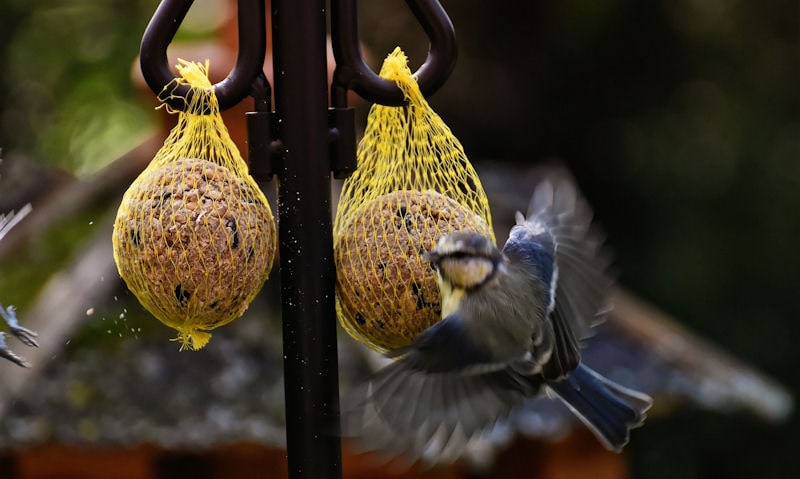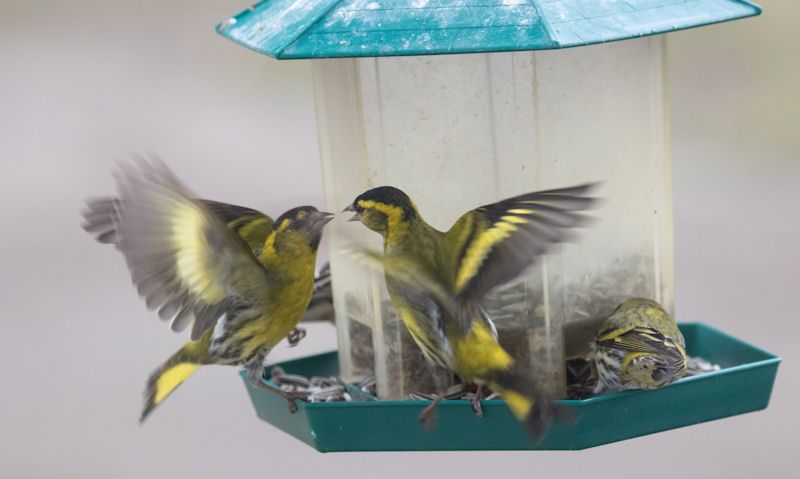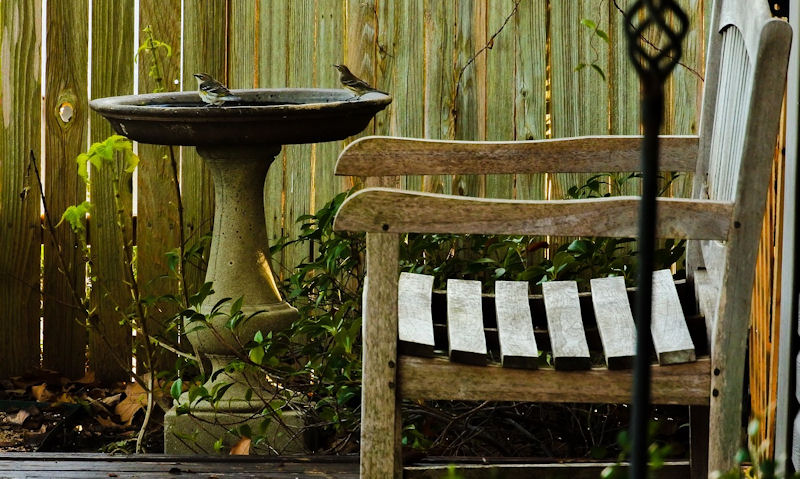Why won't birds eat my fat balls
Few issues exist if wild birds are showing zero interest with your fat balls, so its time to change tack, as we try to find a solution together.
Why won't birds eat your fat balls could be the ingredients making up the bulk of the fat balls is targeted towards the wrong species. To receive few bird species in your garden, you'd need to make sure its the seed, peanut or mealworm fat balls on offer. More importantly, offer up a mix of all to cater to as many birds.
Admittedly, it is unusual for you receive a large number of feeding birds to your garden, to then not see them feed off the fat balls at all.
But the solution to that is, is offering only seed, peanut or mealworm fat balls only; as it could be certain species you receive in your garden only sticking to a certain diet of one or two of the ingredients above.
Great Spotted Woodpeckers love wild bird suet products, but would prefer to feed off a fat ball containing peanut or seed ingredients, rather than mealworms.
If only receiving Woodpeckers to your fat balls then, its imperative to stick to their diet.
But it could be lack of quality fat balls in use, sure, not much goes into fat balls but it is possible to see manufacturers or suppliers of fat balls make up their products in far less inferior ingredients.
What you can do then is be sure to switch fat ball brand, supplier or where you buy them.
And while its possible to see garden birds feed off the bird feeding station with hanging seed or peanut feeders - it would be strange to see birds leave the fat balls well alone.
It could be then the fat balls are a little difficult to access or are out of reach inside the fat ball bird feeder.
I would remove fat balls out of the constraints of the bird feeder, while offering them on a flat surface or break them up to offering crumbled up fat balls on the lawn.
Delicious fat balls, wrong species
Quite possibly what could be going wrong is that you are receiving few wild birds to your garden who eat certain foods, while offering the wrong fat ball ingredients.
Example of that is, as Robins mostly eat seeds, the suet products in questions could indeed be filled with peanuts or something a little less appetising.
Remember different garden bird species are on strict diets, that means they can't or won't eat all the same thing - so therefore you need to expand on what you are currently offering in the fat ball ingredients.
Birds don't peck into fat balls alone, but instead are after the ingredients contained within, so if it has the all important nuts, seeds and even mealworms - you can be sure you'll be catering to as many common garden birds as possible.
Prioritise seed based fat balls for wild birds first thing, as to cater to has many species as possible, including the Robins, Tits and House Sparrows.
But you shouldn't have any difficulty with birds eating mealworm based fat balls, as they are a favourite after all.
To hard or stale fall balls
Could it be your fat balls hanging up in their specialty bird feeder are indeed past their expire date, as birds will know this for sure.
Well, its certainly possible wild birds can consume gone off or stale fat balls, but for most they would prefer to stay well away from the rancid smell.
What else can be a problem is quite often the fat balls can indeed go quite hard as they become stale, or similarly - could freeze over in cold weather - in which case the weather can have its say.
If you continue to feed garden birds fat balls all year round this won't be the issue; if instead fat balls are not consumed at certain times of the year, you'd need to look at seasonality issues or what the weather is doing.
Fat balls have a long life while still sealed up in their original packaging, but this is soon reduced to weeks or days if the weather is causing them to go rotten sooner.
I would therefore pick times of the day, week or year when the garden is at its busiest with feeding birds, as you can then be sure to keep an eye on proceedings to make sure fat balls are not going to waste.
Lack of Fat Ball quality
Is it the wild birds are not specifically eating your fat balls while feeding on everything else, or is it that they are not eating food out of your garden at all.
Well, to not be eating fat balls at all but continue to feed on peanuts or seeds out of the feeder, is unusual for sure.
What this could relate to is the quality of the fat balls not being up to standard.
Fat balls should be eaten up by garden birds if offered, but for them not to show interest could be the lack of quality fat balls in use.
Cheap fat balls from the shop or supermarket are not poor quality, but do offer a fat ball that is highly consumed across the country.
Instead, it could be the fat balls offer no value in taste - however little birds can taste that is - or that the texture or ingredients is off putting.
On the otherhand, if garden birds are not eating anything from your bird feeding station or individual hanging feeder - that is a problem we could resolve.
Location is inaccessible
Small garden birds are sure not to give up accessing the delicious fat balls contained with seeds, peanuts or mealworms, if it is indeed offered to them on a daily bases.
Why won't birds eat your fat balls then could be the fat balls are inaccessible.
Too crowded bird feeding station could be hazardous on its own as it risks squashing birds as they feed.
But in the littlest of wind the feeder could bump up against each other while never giving time for birds to perch as they need too for feeding.
Location can also be a problem even though the fat balls are easily accessible.
So could it be there's lack of natural coverage nearby, or if there is could it be there's too much people traffic - resulting in birds being scared away every once in a while.
Forget about adding fat balls to a bird feeder for now, when you could offer them to wild birds loose; located around the garden as you find a spot that birds will take too in peace and quiet.
Predators close by
Its not just small common garden birds willing to feed on the fatty contents of the fat balls, but it is possible to attract unwanted attention.
Likely unwelcome guests would be a cat from next door or from further a field.
Its therefore possible to see wild birds stay well clear as they know cats wish to do harm, as cats continue to pray on them throughout the day, killing millions every year.
Cat issues cannot be avoided, so its therefore possible to relocate the fat balls up higher on a bracket or an area that is inaccessible to cats.
And while squirrels are less so likely to cause harm to wild birds, but they sure can - the presence of a squirrel or two is certainly going to keep birds away.
Predators are not limited to killing birds but they may be willing to want to feed on the same food sources - so birds will not share the same feeding platform with them.
Fat balls don't need to be added to bird feeders, they could be stacked on a high surface or why not crumble them up to feed ground feeding birds - and that is only if you don't have a predator problem or have pets in which fat balls can be hazardous to their health.
To summarise
Unlikely as it may seem, but if you receive few visitation from a small number of wild bird species, it could be you are laying out the wrong fat balls.
Remember, the fat, or suet itself is not the aim for birds, but instead its what makes up the bulk of the fat balls with the ingredients inside.
Mostly made in seeds or nuts, and while that is a type of food most common garden birds do consume - peanut or seed only fat ball contents could indeed restrict them to certain bird species.
Its therefore possible to buy fat balls that use a mix of ingredients, or use different kinds at a time as to make sure they don't all go without.
Why won't birds eat your fat balls could be this, but it could be the fat balls are way past their best - or could it be they are of poor quality.
In which case its time to buy different kinds of fat balls, from a new supplier.
Accessibility of location is also a concern, can your garden birds access your fat balls, and if they can are they given enough time to relax as they feed.
Feeders bumping against each other if too close, or a lack of flight path with a clear line of sight could be an issue.
Finally, make sure your garden is clear of predators, the presence of cats or predatory birds is enough to see birds not feed in your garden at all.


